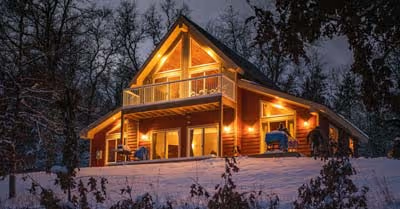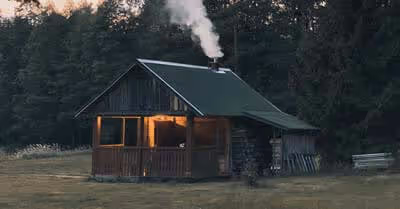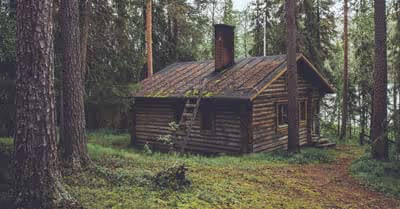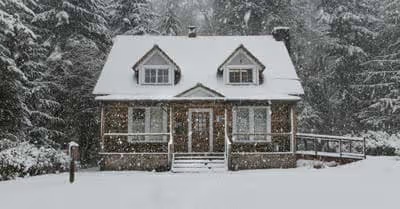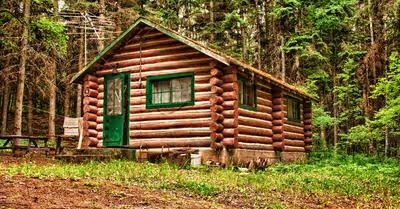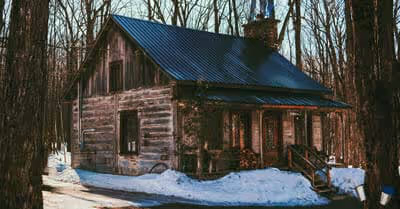Table of Contents
What Is Planning Permission?
Planning permission, which is also sometimes referred to as developmental approval, is simply the permission one has to get from the proper jurisdiction before building, expanding, or, in some cases, even demolishing any building on their property. Whether one can attain this permission or not is subject to the "zoning codes" of said jurisdiction. Zoning codes are known to differ widely throughout various areas, so making assumptions about the zoning codes in any particular area is never a good idea, regardless of however much experience you have with zoning codes in other areas.
Zoning codes are used to distinguish whether or not a given lot of land is suitable for either residential, commercial, or industrial use. Land that is certified for industrial use will not be certified for residential use, and vice-versa. Given that a log cabin will typically take the form of a place of residence, the land that you intend to build your log cabin on will likely need to be zoned for residential use.
What is the Purpose of Zoning Codes?
Although the average outdoorsmen may look down on the notion of zoning codes, they do provide some important benefits for both them and society at large. Zoning codes are the reason that companies aren't allowed to build housing developments on land that has been subject to nuclear fallout, for instance. Zoning codes are also what keeps your neighbor from turning his kitchen into a rubber factory, an act that would quite literally stink up the whole neighborhood.
Obviously, someone wanting to build a log cabin on their property likely isn't going to be too intrusive to other residents in the area. The only caveat to this would be if the log cabin were not aesthetically up to snuff with the rest of the buildings in the area. This is one of the main reasons you are required to submit a plan in order to get a permit for building a log cabin on your property.
Zoning codes can also help you figure out if a land is safe to build on. You never know if the land you are planning on building on is stable enough to support a structure, let alone a structure that is capable of being lived in. Unless you want your brand new log cabin to end up in a sinkhole, you should probably not make too big of a fuss about having to abide by the specific zoning codes set out in your area.
What About Building Codes?
Now that we've established what zoning codes are, it's time to take a look at building codes. While zoning codes regulate where a house can be built, building codes regulate how a house can be built. The purpose of building codes is to enforce a construction standard that promotes both the safety of the individual who owns the property and any other individuals who may be affected by the shoddy craftsmanship of the proposed structure, from potential visitors to future buyers or inheritors.
There are many building codes that are divided up into chapters based on the specific part of the building that they are deigned to regulate. For instance, the number of occupants the building can have, the number of rooms the building can have, and the function that the building is to serve. As these variables change, the imposition of certain building codes may become more or less pertinent.
While zoning codes are apt to change depending on the jurisdiction, you can generally count on building codes to be a good deal more uniform. Whereas zoning codes are a good deal more specific in regards to how they pertain to different areas of land, building codes are much more generic and are meant to be applicable to more general construction.
As with zoning codes, most people will be happy to follow building codes. Building codes are put in place to make sure that building are safe, so following building codes helps ensure that you're creating a safe and sound log cabin. While it may hurt your ego, trusting zoning codes and building codes is always the way to go.
How Do I Obtain Planning Permission?
Obtaining a permit to build a log cabin will typically be a multi-faceted process, although not one that should be too stressful. You will need to apply and receive your planning permit and your building permit separately in most cases. However, some jurisdictions will supply them at the same time. If you require, your local zoning or planning office can help walk you through the steps you will need to take to get approval for both planning and building even before you've submitted your application.
When meeting with these offices initially, you will be able to gather plenty of useful information that will come into play during the construction of your log cabin. For instance, they can tell you how far from the edge of your property the cabin will have to be. As well, they will tell you the minimum square footage that your cabin will have to be in order to be officially designated as a residential space.
When presenting your case to those in charge, you will need to present a detailed proposal for your log cabin. This will show the intended size and layout of your cabin, it's position on your land, and how you intend to go about building it. Should any of these proposed ideas conflict with established zoning codes or building codes in the jurisdiction, your plan will have to be changed before you can get planning permission.
Once you have acquired your planning permit, you will need to acquire a building permit the same way. As stated, sometimes these two permits have to be acquired separately but sometimes they can be acquired at the same time. Regardless, you are going to need both before you can begin breaking ground on your new log cabin.
Organizing Building Inspections
After you have acquired all the permission you need and have started work on your log cabin, you are generally going to have to start dealing with building inspections. How often and when you need a building inspection will most likely be determined during the planning stage. Typically, there are allotted progress points set alongside your plan wherein your burgeoning cabin will be required to undergo a building inspection. The number of building inspections you are going to be subject to will depend largely on the size of the cabin you are planning on constructing.
It is your building inspector's job to make sure that no code issues are arising during the construction of your log cabin. They can oftentimes offer timely advice that will both save you time and money while also helping you build the safest and strongest cabin you can. For this reason, it's best not to try and hide any problem areas just to get your building inspector out of the door faster- they're there to help!
Organizing building inspections will typically be your responsibility. You should have all the information needed to plan out when to organize your building inspections. Always be sure to plan them out well in advance, and make sure that your construction is unfolding according to plan.
When Do You Not Need Planning Permission?
While most log cabin constructions will explicitly require planning permission from your local jurisdiction, there are some caveats to this generalization. For one thing, most jurisdictions do not require planning permission to build a structure below a certain size. These structures are typically meant to be sheds or outdoor storage areas and not places of residence. However, if you are a man of few means, you might be able to live comfortably in a log cabin that is small enough so as to not require planning permission to build.
Should you wish to try and build a log cabin that doesn't require planning permission, you should still do a good deal of planning on your own terms. Always be totally 100% positive that you are functioning within the good graces of the law by double-checking, and then checking again, that what you are planning on doing is acceptable. Rules and regulations can change at the drop of a dime, and you never know when you're accidentally going to be stepping on the toes of those in charge.
Recent Articles



